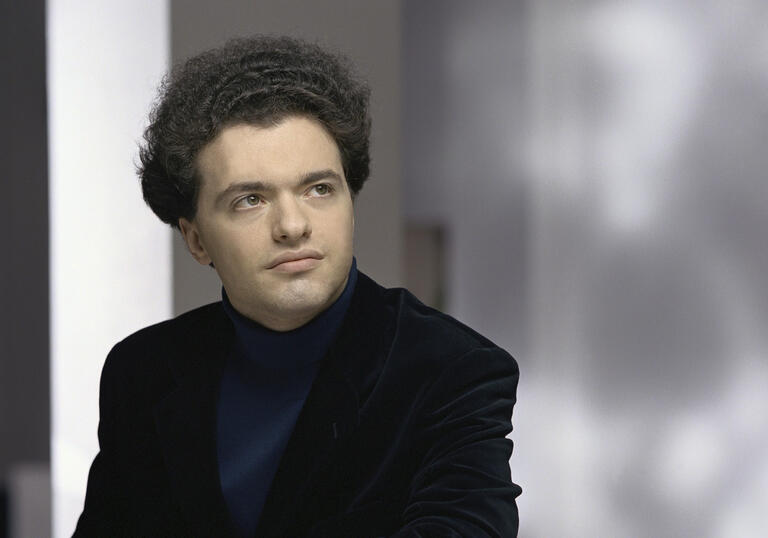
Programme and performers
Johann Sebastian Bach Chromatic Fantasia and Fugue
Wolfgang Amadeus Mozart Piano Sonata No 9 in D major
1. Allegro con spirito
2. Andantino con espressione
3. Rondeau: Allegro
Frédéric Chopin Polonaise No 5 in F sharp minor
Sergei Rachmaninov ‘Lilacs’ from 12 Romances, Op 21
Prelude in A minor, Op 32 No 8
Prelude in G flat major, Op 23 No 10
Études-tableaux, Op 39:
No 1 in C minor
No 2 in A minor
No 4 in B minor
No 5 in E flat minor
No 6 in A minor
No 9 in D major
Evgeny Kissin piano
Artist biography
Evgeny Kissin is revered the world over by audiences and critics alike for the virtuosity and eloquence of his pianism and the imagination and insight of his interpretations. He has worked with leading conductors, including Claudio Abbado, Vladimir Ashkenazy, Daniel Barenboim, Christoph von Dohnányi, Carlo Maria Giulini, James Levine, Lorin Maazel, Riccardo Muti and Seiji Ozawa.
He was born in Moscow in 1971 and began to play by ear and improvise on the piano at the age of 2. At 6, he enrolled at Moscow’s Gnessin School, where he received lessons from Anna Pavlovna Kantor, who became his only teacher. At the age of 10 he made his concerto debut with Mozart’s Piano Concerto in D minor, K466 and he gave his first solo recital in Moscow a year later. His international breakthrough came in 1984, when he performed Chopin’s piano concertos in the Great Hall of the Moscow Conservatory with the Moscow State Philharmonic conducted by Dmitri Kitaienko. This concert was recorded live by Melodiya, and a two-LP album was released the following year.
He made his debut in Eastern Europe in 1985, toured Japan the following year and appeared in Western Europe for the first time at the 1987 Berlin Festival. In 1988 Herbert von Karajan invited him to perform Tchaikovsky’s Piano Concerto No 1 with the Berlin Philharmonic at the orchestra’s forthcoming New Year’s Eve Concert, which was released on DG. He gave his first performance at the BBC Proms in 1990 and made his North American debut soon after, performing Chopin’s two piano concertos with the New York Philharmonic and Zubin Mehta. He opened Carnegie Hall’s centennial season in September 1990 with a debut recital, the live recording of which proved an exceptional success.
This season he returns to the Vienna Philharmonic under Jakub Hrůša, London Symphony Orchestra under Sir Simon Rattle and the Hamburg and Warsaw Philharmonic orchestras under Kent Nagano and Andrey Boreyko respectively. He also undertakes a recital tour with Renée Fleming, a solo tour of which tonight’s concert is part and participates in a gala concert honouring the memory of Andrei Sakharov at Carnegie Hall.
The newest addition to his award-winning discography is an album of Beethoven piano sonatas on DG, with which he signed an exlusive contract in 2017. His previous recordings have received numerous awards and accolades, having contributed significantly to the library of masterpieces recorded by the world’s greatest performers. His discography also includes Grammy Award-winning recordings of Prokofiev’s Piano Concertos Nos 2 and 3 and a disc of solo works by Scriabin, Medtner and Stravinsky; other highlights include Beethoven’s piano concertos under Colin Davis; and discs of solo works by Brahms, Chopin and Schumann. He was also the subject of a documentary film by the late Christopher Nupen: Evgeny Kissin: The Gift of Music.
He has received awards and tributes from around the world, including an Honorary Doctorate of Music by the Manhattan School of Music; the Shostakovich Award, one of Russia’s highest musical honors; an Honorary Membership of the Royal Academy of Music; and an Honorary Doctorate of Letters from the Hong Kong University.
